Roller Compacting Concrete goes from strength to strength
Since trials of roller compacted concrete (RCC), a durable and fast construction solution for heavy duty pavements, were undertaken in New Zealand in 2020, the partnership between Firth and Rolco New Zealand has gone from strength to strength. Firth has continued to invest, support and develop this revolutionary and sustainable paving method in the New Zealand market.
"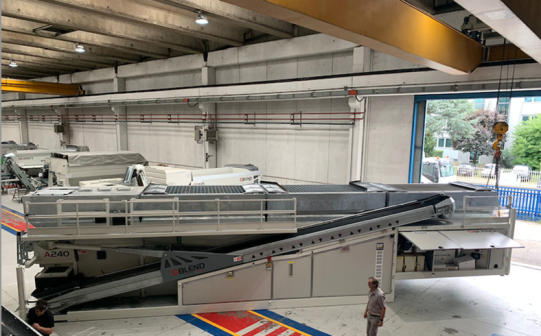 Due to a lower water content and higher cement ratio the RCC mix is very dry compared to standard concrete,” explains Dominic Sutton, Head of Southern for Firth. “We have invested in two mobile Pugmills which are particularly suited to the RCC paving solution. This production method means the very dry concrete mix is continuously mixed in the Pugmill and is then tipped into tipper trucks for quick and easy dispersal.”
Due to a lower water content and higher cement ratio the RCC mix is very dry compared to standard concrete,” explains Dominic Sutton, Head of Southern for Firth. “We have invested in two mobile Pugmills which are particularly suited to the RCC paving solution. This production method means the very dry concrete mix is continuously mixed in the Pugmill and is then tipped into tipper trucks for quick and easy dispersal.”
Dom says this method suits the very large pavement areas that RCC is particularly suited to.
Willem de Bod, Managing Director for Rolco and the team have been utilising Firth’s mobile Pugmill at two large pavement projects in the central North Island at Tauranga and Kawarau. “A new smaller Pugmill plant is about to land in New Zealand ex Italy for Rolco’s continued use at Kawarau,” adds Dom. “The larger plant will be moving to Auckland for large projects starting in the New Year.”
RCC in action …
Customer: Tauranga City Council.
Project location:
Roads in the industrial areas of Tauranga and Mount Maunganui.
Project:
Around 12,000m2 of pavement was laid around two roundabouts and the straight sections of road between them in Tauriko.
Why chose RCC?
A very durable pavement option which is cost efficient, is a low carbon solution and has a fast turnaround time.
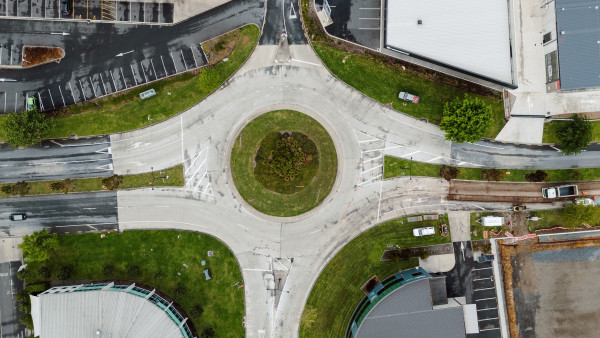
RCC attracting international attention …
“Eric Ferrebee, from the American Concrete Association was in New Zealand to present on Concrete Roads at the Future Roads Conference in Hamilton,” explains Ingrid de Bod, General Manager for Rolco. “He came to see us to look at the paving on a section of road in Tauranga industrial area. He noted that the roundabouts we completed were the first successful roundabouts completed in RCC he had ever seen and that the finish was very good. He also said that he wasn’t able to tell that it was RCC versus standard concrete.”
On the photo from left to right: Tim Bulmer, Regional Materials Manager (Bay of Plenty) for Firth, Eric Ferrebee, Senior Director of Technical Services, American Concrete Association and Ingrid de Bod, Rolco General Manager.
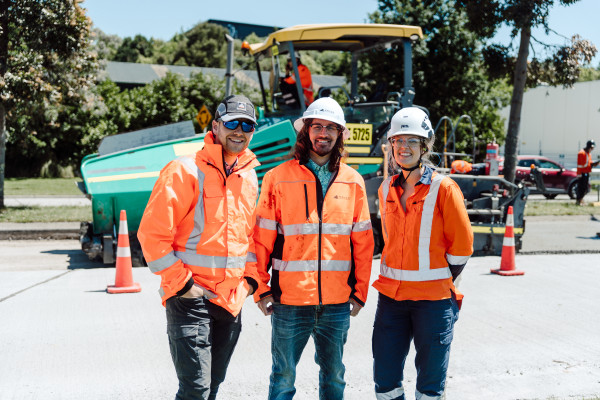
RCC - A low carbon, hard-wearing cost-effective solution …
“We have just started work in Kawarau for Sequel to pave logging truck haul roads and the log yard,” explains Ingrid. “RCC has been selected because it is durable, cost efficient and is a low carbon solution, which is featuring as a requirement for large infrastructure projects like this more and more. We are not sure yet how many square metres we will be required to complete but it is potentially more than 100,000m2 – which is massive.”
If you have an area of 10,000m2 or 3000m2 that requires paving, RCC is quick to lay, cost effective and a very durable heavy duty pavement system. Speak to Firth today about Roller Compacted Concrete. Ph: 0800Firth1 or email: info@firth.co.nz.
Want to know more? The big questions answered…
Quick facts …
-
Lower Water/Cement ratio = higher strength
-
Better aggregate interlocking
-
Quickly trafficable - as early as 72 hours after placement
-
All-year construction
-
Better performance in wet climates
-
Sustainability (all raw products 100% NZ produced)
-
Faster speed of construction
-
Lower up front and full lifecycle costs
-
Low maintenance costs
-
Suitable for high load applications
-
RCC reduces/eliminates the need for patching and resurfacing
What is RCC?
A concrete process that is a durable and a fast construction solution for heavy duty pavements. It gets its name from the method of construction used to place the material. RCC uses an almost zero-slump mix that is then mechanically placed with a paving machine. Just like asphalt, it is laid and then roller compacted.
Where can RCC be used?
Industrial yards; container yards; airport runways; heavy duty pavements; high load applications; intermodal pavements; log yards; parking lots; farm tracks, feed pads; road base/surfacing, highway base strengthening and hard stands.
How does it work?
The specialised mix is mixed in a Pugmill or a central mixing plant.
How many m2 metres can be laid in a day?
up to 2,000m2 per day.
How long will it take to dry/cure?
|
|
RCC |
Standard Concrete |
|
To walk on |
Immediately |
48 hours |
|
Light weight traffic |
48 hours |
7 days |
|
Heavy duty traffic |
3 - 7 days |
28 days |
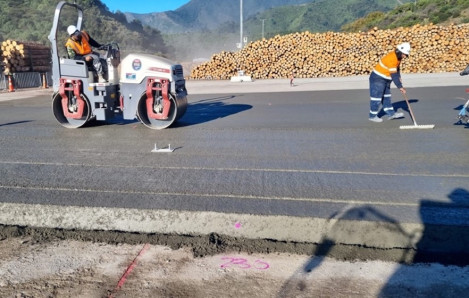
What thickness of pavement can be laid?
From 100mm to 230mm depending on requirements. A second layer can be laid on top of a fresh layer creating a pavement thickness greater than 230mm.
Can you lay RCC over an existing asphalt paved surface?
Yes
What makes RCC a better sustainable option with a lower carbon footprint?
Strength of concrete is driven by the water:cement ratio. The lower the volume of water that is used in the concrete, the less cement is required for a given strength.
Due to the placing and compaction methods employed in RCC concrete, the mix is placed at a zero slump, so no additional water for workability is added and a larger size aggregate, which, also requires less water and therefore less cement in the mix, is used. The roller compaction of this mix tightly compacts the aggregate which aids in mechanical interlock of the aggregates resulting in higher flexural strengths, a primary concern for industrial pavements. Less cement (by 100 kgs per cubic metre of concrete) means a far lower carbon footprint. RCC also does not require the use of steel or steel mesh.
How much water does RCC use per m3 of concrete?
One cubic metre of standard 19mm 40PMa concrete at a 140mm slump requires 180L of water vs one cubic metre of 40Mpa RCC which uses only 125L of water, meaning 100 kg less cement per m3.
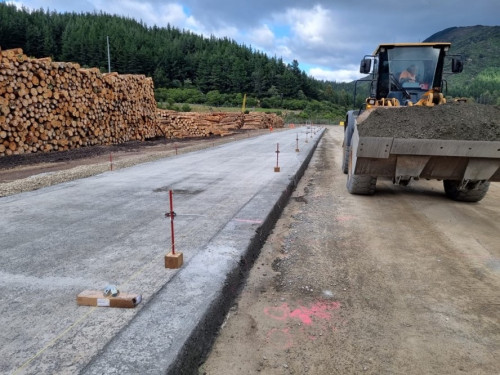
Why is RCC more durable?
“Durability really refers to how long the pavement will last,” says Trevor Sawyer, Technical Manager, Fletcher Building. 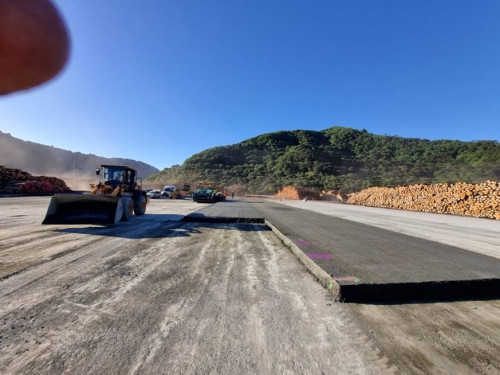 “Will it stand the test of time and is it functional for its purpose? Because all the aggregates are all locked up by the compaction, and there is very little water and an equally low cement content, this concrete is not prone to the shrinkage of normal concrete. There is also no steel reinforcing so there is no risk of anything getting in there and breaking it up due to steel corrosion. Because a relatively large aggregate is used, and all the aggregates are locked up by the compaction, a RCC pavement has a high abrasion resistance and is extremely durable.”
“Will it stand the test of time and is it functional for its purpose? Because all the aggregates are all locked up by the compaction, and there is very little water and an equally low cement content, this concrete is not prone to the shrinkage of normal concrete. There is also no steel reinforcing so there is no risk of anything getting in there and breaking it up due to steel corrosion. Because a relatively large aggregate is used, and all the aggregates are locked up by the compaction, a RCC pavement has a high abrasion resistance and is extremely durable.”
“In terms of cement efficiency RCC delivers a significantly higher strength concrete than normal concrete for equal cement contents. Put simply, the more water we use the more cement we need to use to achieve a given strength. The more cement and water we use the more the concrete is prone to shrinkage, creep, curling - to name a few. Properly placed and compacted, roller compacted concrete has the lowest use of cement per cubic metre for a given strength, and the lowest GWP per cubic metre of concrete.”
“Because we design this concrete with no steel there is no risk of corrosion or the steel deteriorating and causing problems later. RCC really comes into its own in marine environments such as ports or where there is high chlorine or salt that would normally affect steel reinforced concrete. With the absence of steel, we can expect far better durability and a longer service life from the concrete than competing products.”
What is more cost-effective? Standard concrete or RCC?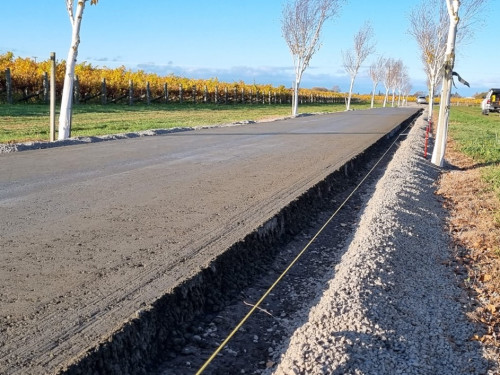
Due to the need to get specialised equipment to the project site, the point where RCC becomes more cost effective is for projects over 10,000m2 of paved surface or 3,000m3 of concrete required. The other major driver in cost would be usable time where RCC can deliver a trafficable pavement in a far shorter time period with no extended waiting times.
Flexural strength concrete explained …
“Flexural strength is the pavement’s ability to carry a load and is critical to how soon we can traffic it,” explains Trevor. “Flexural strength in normal concrete is very low compared to compressive strength. With the correct selection of aggregates and the use of compaction equipment the flexural strength we are obtaining for RCC is more than double that of traditional concrete for the same strength. It’s the nature of the aggregate and how they interlock. The compaction forces all the shapes edges and angles to lock into each other and that is what is driving our high flexural strength.”
“The flexural strength for a standard 40MPa concrete is typically between 4 - 4.8Mpa. RCC flexural strength is over 7.5Mpa which we are achieving in just 7 days with a significantly lower cement content than normal concrete!”
Specialist placing technology and methodology
“For the pavement to be able to withstand the weight of a roller this system requires specialist placing technology and methodology which is where our partner Rolco New Zealand come in,” Trevor says. “There’s a real science behind the technology which takes into account the size of aggregate used, along with the amount of water and cement required to create a zero-slump mix that can still be fully compacted to full placement depth. It’s a very technical product with a lot of science behind it, which Firth has the capacity to develop and support.”